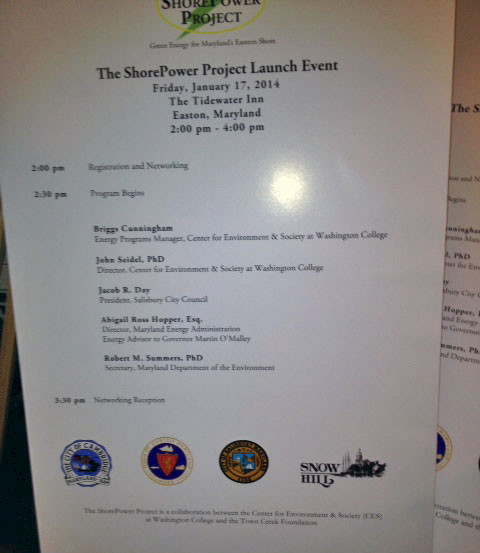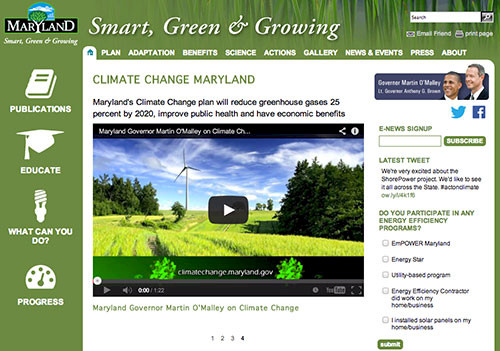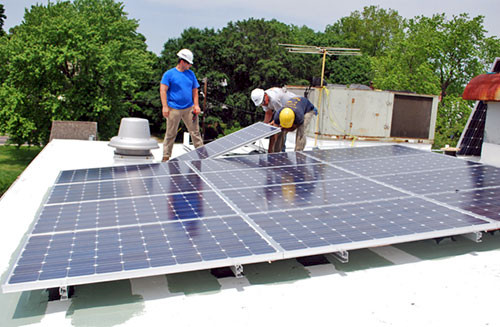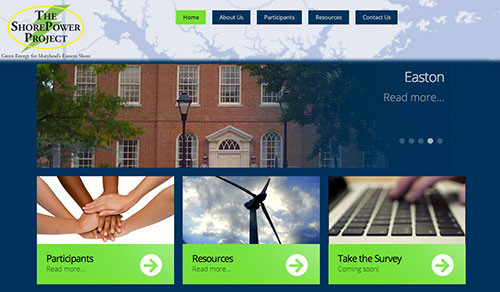ShorePower project launched
Bill Dennison · | Science Communication |I attended the launch of the ShorePower Project at the Tidewater Inn in Easton, Maryland on 17 Jan 2014. It was a nice event on the topic of green energy for the Delmarva peninsula. The project is funded by the Town Creek Foundation, based in Easton, Maryland. Four municipal governments - Cambridge, Easton, Salisbury, and Snow Hill - are receiving funding to help them transition to green energy sources. The Center for Environment and Society at Washington College, a small liberal arts college in Chestertown, Maryland, is a partner in the project with the role of disseminating results and working toward broad adoption of the green energy transitions.

Briggs Cunningham from Washington College was the moderator and he showed a screen shot of the home page of Maryland's climate change website that the Integration and Application Network hosts and helped to produce. I love it when people use IAN materials, but this was only a taste of what was still to come. Briggs talked about the synergy in Chestertown between the initiatives of their progressive mayor, Margo Bailey and initiatives at Washington College. He highlighted the reduction in greenhouse gas emissions of 200 tons per year by the town of Chestertown, constituting a savings of almost $150,000 per year in energy costs.

John Seidel, the Director of the Center for Environment and Society talked about the advantages of working in a small liberal arts college, and the importance of getting students out of the classroom. He commented that students can bring fresh ideas and energy with a willingness to learn to apply to problem solving. In discussing the issue of meeting our energy challenges, John quoted Henry Ford, "Most people spend more time and energy going around problems than in solving them."
Jake Day, President of the Salisbury City Council, talked passionately about the importance of civic leadership. Jake portrayed Salisbury as the unofficial capital of the Eastern Shore, and chronicled the history of Salisbury's recent energy policies. He was very proud of the conversion of traffic lights and parking garage lights to low energy LED lights. Jake also spoke glowingly about the Eastern Shore cities and towns, with their unique character and walkable, compact character.
Abby Hopper, the Director of Maryland Energy Administration, talked about the goal of developing clean, affordable and reliable energy for all Marylanders. She indicated that her relatively small department of 32 staff were nimble and flexible. Abby discussed the three Maryland goals of 1) reducing per capita energy consumption by 15% by 2015, 2) growing the renewable energy contribution to 20% by 2022, and 3) reducing greenhouse gas emissions by 20% by 2020. She highlighted the various grants and loan programs that have been created in Maryland to make progress toward achieving these goals. One of the interesting programs that Abby discussed was to install backup generators for gas stations along major roads in case of power outages.

Bob Summers, Secretary of the Maryland Department of Environment, gave the best talk that I have seen by a Maryland state employee. His PowerPoint used the excellent graphics which the Integration and Application Network created and Bob is very knowledgeable about the subject and he spoke with authority and real passion. He was able to talk off script as well and he highlighted the effect of climate change on sea level rise, calling it a "triple whammy" for Maryland. Bob was referring to the "triple whammy" impact of 1) thermal expansion induced sea level rise, 2) land subsidence and 3) Gulf Stream weakening, leading to a relaxation of the surface seawater that is pulled away from the coast by the Gulf Stream flow. It was gratifying to see our graphics used to such good effect.
Briggs Cunningham wrapped up the presentation, highlighting their website (www.shorepowerproject.com) and invited people to complete a survey that they have developed and will be disseminating soon.

Overall, it was a very nice event and great to meet other people committed to developing a more sustainable planet in my own backyard. I enjoyed meeting old friends and new people, including a person from Wicomico County working on power generation from an anaerobic digester that would use biosolids from sewage treatment plants and chicken litter from poultry houses.
About the author
Bill Dennison

Dr. Bill Dennison is a Professor of Marine Science and Vice President for Science Application at the University of Maryland Center for Environmental Science.